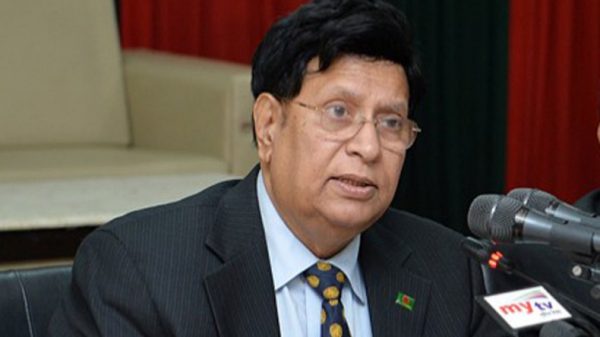Hope of repatriation before UNGA dashed: FM

Shawdesh Desk:
Foreign minister AK Abdul Momen on Monday said his hope for starting repatriation of Rohingya people before the The United Nations General Assembly in September was dashed as the meeting between a Myanmar team with the Rohingyas in Cox’s Bazar did not bring the expected result.
‘I was hopeful before this visit,’ the minister told a small group of journalists, adding that, ‘Now my hope has waned.’
He, however, observed that there was a ‘small breakthrough’ in the discussions between the Myanmar delegation and the Rohingya people in Cox’s Bazar.
‘Discussing about citizenship by the Myanmar delegation is itself a breakthrough,’ Momen told some journalists at his office on Monday, adding that Myanmar informed the Bangladesh side that ‘there is a way to grant citizenship to the Rohingya people under the 1982 Citizenship Law.’
The Rohingya people should avail this opportunity to go to Rakhine and get the citizenship in their own interests, he said.
The minister said Bangladesh had nothing to do on citizenship. ‘It is a matter between Myanmar and its own people, in this case Rohingyas, he said elaborating that ‘we (Bangladesh) must not be hostage to this demand (on citizenship).
At a foreign secretary-level meeting in Dhaka on Monday, the Bangladesh government handed over a fresh list of 25,047 Rohingya people of about 6,000 families to the Myanmar authorities for verification for repatriation to Rakhine State, acting foreign secretary Kamrul Ahsan, who led the Bangladesh delegation in the meeting, said.
This was in addition to the two lists of about a total of 30,464 people handed over to Myanmar authorities for verification of eligibility for repatriation in the last one and a half years, foreign ministry officials said.
Myanmar cleared so far 11,333 people for repatriation out of 30,464 people, they said.
Putting an emphasis on building trust between the Rohingyas and the Myanmar authorities, Kamrul said, the Rohingyas have some key demands — citizenship, freedom of movement, opportunity for economic activities and returning to their places of origin from where they were uprooted. ‘A single visit can’t solve these issues,’ he added.
Myanmar foreign ministry’s permanent secretary Myint Thu led their delegation in the talks in Dhaka.
He said they were trying to convince the Rohingyas to go back to Rakhine. ‘We have provided them with information… I asked them that this is the right time for them to consider whether they should go back or not because we explained the key issues. So, this is their decision whether to go back or not.’
When asked about the concerns of Rohingya people about their rightful citizenship and ethnicity, he said, ‘We’ve heard their voices and concerns.’
Myint Thu led a Myanmar delegation that met with separate groups of the Rohingyas living in the makeshift camps in Ukhiya and Teknaf of Cox’s Bazar on Saturday and Sunday.
Rohingya people might be granted citizenship on their return under the conditions mentioned in the 1982 citizenship law, Myint Thu said in Cox’s Bazar on Sunday.
More than 7,00,000 Rohingyas, mostly women, children and aged people, entered Bangladesh after fleeing unbridled murder, arson and rape during ‘security operations’ by Myanmar military in Rakhine, what the United Nations denounced as ethnic cleansing and genocide, beginning from August 25, 2017.
The last incident of Rohingya influx took the number of undocumented Myanmar nationals and registered refugees in Bangladesh to about 11,16,000, according to estimates by UN agencies and Bangladesh foreign ministry.























Leave a Reply